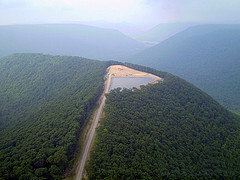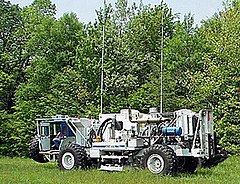Natural gas as a transportation fuel the topic of conference
live.psu.edu/story/59583#nw69
Thursday, May 3, 2012

Increasingly, bus companies are switching to natural gas fuel. Shown here, a Centre Area Transportation Authority vehicle 'gases' up.
UNIVERSITY PARK, Pa. — A one-day conference in Lehigh County, sponsored by Penn State’s College of Agricultural Sciences, will provide a comprehensive overview of using natural gas as a transportation fuel in Pennsylvania and the mid-Atlantic region.
“Natural Gas Vehicles: The Road Ahead in Pennsylvania” will be held from 9 a.m. to 4:30 p.m. on Monday, June 11, at Penn State Lehigh Valley in Center Valley. The program is being organized by Penn State Extension.
“The conference will be a place where clean-air and clean-transportation advocates, industry stakeholders, fleet managers and policymakers can learn the fundamentals of using natural gas as a transportation fuel,” said conference coordinator Dave Messersmith, extension educator and member of Extension’s Marcellus Education Team.
“Professionals attending the sessions will be able to network with other natural gas vehicle stakeholders, and they can discuss opportunities and challenges to greater adoption of natural gas as a transportation fuel.”
The conference will feature sessions titled “A Primer on Natural Gas as a Transportation Fuel,” “What’s Happening with Natural Gas Vehicles in Pennsylvania and the Mid-Atlantic,” “Understanding Shale Gas in Pennsylvania and Natural Gas Market Outlook,” “The Texas Clean Transportation Triangle: A Model for Success,” “Engine and Conversion Technologies,” and “Fueling Station Concepts and Technologies.”
Presenters include researchers, entrepreneurs and industry experts who will provide a fundamental understanding of natural gas as a transportation fuel.
The registration fee for the conference is $149. For more information, contact Carol Loveland at 570-433-3040 or by email at cal24@psu.edu.
To register for the conference by phone, call toll-free 877-489-1398. To register online, go to the conference website at http://agsci.psu.edu/natural-gas-vehicles and click on RSVP in the gray bar near the top of the page.
Science-based surveillance effective in minimizing BSE risk in cattle
live.psu.edu/story/59461#nw69
Friday, April 27, 2012
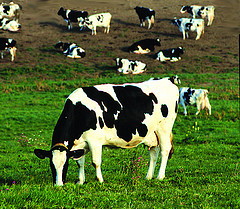
BSE was discovered in a dairy cow in California, but the country's beef supply is safe, according to an expert in the College of Agricultural Sciences at Penn State.
UNIVERSITY PARK, Pa. — Beef consumers should not overreact to the first case of so-called “mad cow disease” in the United States since 2006, discovered recently in a dairy cow in California, according to a veterinarian in Penn State’s College of Agricultural Sciences.
The infected cow, the fourth ever discovered in this country, was found as part of an Agriculture Department surveillance program that tests about 40,000 cows a year for the fatal brain disease, more accurately called bovine spongiform encephalopathy, or BSE. The disease can cause a fatal human brain disease in people who eat tainted beef.
It’s that close scrutiny of the nation’s beef supply by USDA that should reassure consumers, noted Bhushan Jayarao, professor of veterinary and biomedical sciences, who is director of the Penn State Animal Diagnostic Laboratory.
One of three facilities in the Pennsylvania Animal Diagnostic Laboratory System, the lab on the University Park campus has been testing animal tissues for disease since the mid-1980s and was formally established in 1992. It is a part of the national surveillance network that performs tests for BSE.
“No meat from that cow in California was bound for the food supply,” said Jayarao. “The cow, more than 30 months old, had died and was to be rendered — made into soap or other household products. Because the cow died, it was tested for BSE.”
BSE is caused by an abnormal protein called a prion. Research indicates that the disease is most commonly spread when cattle eat feed containing rendered byproducts from infected cattle. As a result, the United States in 1997 banned the practice of feeding animal by-products to ruminants.
However, in this most recent case, Jayarao explained, analysis found that the cow had what is referred to as an atypical case, which is believed to have occurred spontaneously through a mutation.
“That means the cow didn’t get the disease from eating infected cattle feed, and that’s critical,” he said. “It’s just a random mutation that can happen every once in a great while in an animal. Random mutations do occur in nature.”
BSE in cows has been a problem in the past when animal byproducts were used to supplement animal feed. In the United Kingdom, more than 180,000 cows may have been infected during the 1980s and 1990s. In other countries, the infection’s spread was blamed on farmers adding recycled meat and bone meal from infected cows into cattle feed.
Jayarao said the fact that the testing system found “what is a really rare event” is a strong indication that the system works. He suggested that the California cow’s form of the disease so rarely occurs that consumers should not be alarmed.
“USDA has taken a proactive stance with its surveillance program, which caught this case,” said Jayarao. That’s the good news.”
The previous three confirmed cases of BSE in cows in the United States occurred in a Canadian-born cow in 2003 in Washington state, in 2005 in Texas and in 2006 in Alabama. Both the 2005 and 2006 cases were also atypical varieties of the disease, Jayarao said.
He described the measures put into place by the U.S. government and other nations in recent years to prevent BSE from entering the food chain as interlocking safeguards, and he stressed that there is evidence they are effective. In 2011 there were only 29 confirmed cases of BSE worldwide, a dramatic decline since the peak of 37,311 cases in 1992.
Jayarao credited the decline of the disease to effective banning of animal products in cattle feed.
Frightening as BSE is, Jayarao contends that it is best for the public to have the latest and most accurate information about risks and safeguards that exist related to their food supply. “It is always better for producers to have educated consumers,” he said. “Everyone benefits when consumers get reliable information from credible sources.
“There are so many checks and balances in place now, and that should be of great comfort to the consumer,” said Jayarao. “Beef in the retail market is very safe.”
Study suggests shale-gas development causing rapid landscape change
live.psu.edu/story/59331#nw69
Friday, April 20, 2012
UNIVERSITY PARK, Pa. — As the Marcellus natural-gas play unfolds in Pennsylvania, several trends are
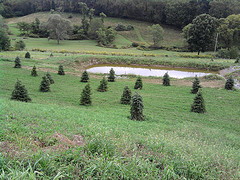
The greatest amount of Marcellus Shale natural gas development falls within the Susquehanna River basin.becoming increasingly clear, according to researchers at Penn State.
First, most of the development is occurring on private land, and the greatest amount of development falls within the Susquehanna River basin. Second, a regional approach to siting drilling infrastructure is needed to help minimize development in core forest and productive agricultural lands and to decrease the potential risk to waterways.
Patrick Drohan, assistant professor of pedology in the College of Agricultural Sciences, was lead investigator on a study that examined the early effects of Marcellus gas development on landcover change and forest fragmentation in the Keystone State.
Drohan estimates that slightly more than half of the well pads in Pennsylvania occur on agricultural land; most of the rest are on forestland, but many of those are on core forest that is privately owned.
The loss of agricultural land to shale-gas development presents some concern because, in some areas, drilling is now competing with food production for space on the landscape, the study states.
“Our results suggest,” said Drohan, “that shale-gas development could substantially alter Pennsylvania’s landscape. The development of new roads to support drilling could affect forest ecosystem integrity via increased fragmentation.”
The fragmentation of forestland, especially northern core forest, places headwater streams and larger downstream waterways at risk of pollution, the study suggests. Based on the intensity of development in the Susquehanna River basin, future expansion of shale-gas production in this basin could become a significant land- and water-management challenge for Chesapeake Bay water quality and ecosystem services.
The concentration of existing core forest in the northern part of the state — and the focus of drilling in this area, largely on private land — led the researchers to conclude that remaining areas of public land are key refuges for the protection of wildlife, ecosystems and associated ecosystem services.
“These areas should receive further protection,” Drohan said. “An organized effort across government and private entities may be a way to manage development.”
Coauthors of the study, which was published in the March 25 issue of the journal Environmental Management, were Margaret Brittingham, professor of wildlife resources; Joseph Bishop, research associate in geography; and Kevin Yoder, former field assistant in the School of Forest Resources.
The research was sponsored by the Heinz Endowments, Marcellus Center for Outreach and Research and the USDA-NRCS Soil Survey program
New website provides guidance on Marcellus Shale development
live.psu.edu/story/59159#nw69
Friday, April 13, 2012
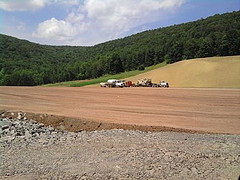
The 'Marcellus Shale Electronic Field Guide' provides information about mitigating landscape changes as a result of natural-gas development, such as the well-pad construction pictured here.
UNIVERSITY PARK, Pa. — A new website developed by Penn State’s College of Agricultural Sciences and Penn State Extension offers assistance in land management at all stages of shale-gas infrastructure development.
The “Marcellus Shale Electronic Field Guide” is an unbiased manual aimed at presenting the best possible options in Marcellus Shale development for Pennsylvania’s future.
“The guide provides a comprehensive overview of how landscapes change during shale-gas development and offers ways throughout the process to minimize adverse effects while maximizing long-term site restoration success,” said Patrick Drohan, assistant professor of pedology and one of the website’s lead authors.
The guide’s sections reflect the questions asked most frequently by landowners and managers and by gas-industry employees.
The field guide introduces ecological concepts relevant to shale-gas development, including habitat fragmentation and restoration and basic wildlife science. It includes sections on predevelopment issues, such as effects of shale-gas development on agriculture and forestland, control of site activity, soil erosion and compaction, and planning for spills, accidents and invasive species control.
Restoration of shale-gas development sites is explored through pages on setting goals for restoration, landscape reconstruction, revegetation options, and restoring or creating wildlife habitat. The site includes detailed analyses of important wildlife species in Pennsylvania: wild turkey, ruffed grouse and white-tailed deer, with more featured species to come.
Landowners looking for general guidance on leasing provisions may benefit from sample leases and a section on best management practices.
The field guide also includes an image gallery and a public forum in which registered users can ask questions and receive feedback from those with on-the-ground experience.
“Exploration and development of natural gas within the Marcellus Shale formation is occurring at an accelerating rate across much of Pennsylvania and may produce large-scale ecological change,” said Margaret Brittingham, professor of wildlife resources and website co-author.
“There is a critical need among public and private landowners for information on how to develop drilling sites and their associated infrastructure so as to minimize ecological damage and allow restoration of sites to predrilling conditions,” she said. “We hope this website helps to fill that need.”
The website is based on work supported by the Heinz Endowments and was designed by Penn State’s Center for Environmental Informatics. Any opinions, findings, conclusions or recommendations expressed in the field guide are those of the authors and do not necessarily reflect the view of the sponsor.
The website, which is also accessible from smart phones and similar devices, can be viewed at http://marcellusfieldguide.org/index.php
Goddard Forum to examine oil, gas development impacts on forests
live.psu.edu/story/58780#nw69
Thursday, March 29, 2012
UNIVERSITY PARK, Pa. — Penn State’s 2012 Goddard Forum, “Oil and Gas Development Impacts on Forested Ecosystems: Research and Management Challenges,” will bring together scientists, managers, conservation organizations and industry representatives working with oil and gas development to share research results and management strategies.
The conference, to be held April 9-10 at the Penn Stater Conference Center Hotel, is sponsored by the School of Forest Resources in the College of Agricultural Sciences. The U.S. Forest Service’s Northern Research Station, headquartered in Newtown Square, Pa., is a co-sponsor of the event.
“During this two-day meeting, we will have a diversity of invited and offered presentations focused specifically on impacts on and adaptive management strategies for forested ecosystems,” said Jim Grace, Maurice K. Goddard Chair in Forestry and Environmental Resource Conservation.
“The pertinent questions revolve around how we can manage gas-development activities in a manner that preserves our environmental quality of life and deals with our social needs, while providing economic benefits to our citizens and bolstering our supply of clean domestic energy.”
Grace, who served as director of the Bureau of Forestry in the Pennsylvania Department of Conservation and Natural Resources from 1994 to 2007, noted that conference presentations by both managers and scientists will explore the full range of forest issues.
“They will discuss landscape modification, water, air, habitat, roads, timber supply, invasive species, noise, landscape restoration, management and monitoring strategies, and other topics focused on forests,” he said. “Sessions will cover public as well as industrial and other private forests.”
More than 30 conference speakers will represent academia, state and federal government, industry, and environmental and conservation organizations. Additional information, including a complete list of speakers and presentations, is available on the 2012 Goddard Forum website at http://psu.ag/wJUONr.
For information about conference accommodations, meals and registration, contact the Office of Conferences and Short Courses toll-free at 877-778-2937 or at csco@psu.edu via email.
Webinars on March 15 and 22 to examine Pa.’s new gas-well impact fee
live.psu.edu/story/58352#nw69
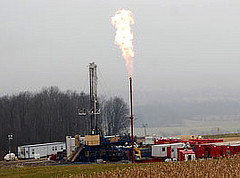
The webinars are aimed at two different audiences. The March 15 session is a broad overview for the public; the March 22 session is intended for local municipal officials.
UNIVERSITY PARK, Pa. — Two Web-based, evening seminars presented by Penn State Extension, on March 15 and 22, will provide a detailed examination of the shale-gas impact fee legislation recently passed by the General Assembly and signed into law by the governor.
The free webinars, both beginning at 7 p.m. and running 90 minutes, are aimed at two different audiences. The March 15 session, “What the Public Needs to Know about the New Shale Gas Impact Fee: Act 13,” will offer a broad overview, while the March 22 session targets local municipal officials in areas where Marcellus gas-well drilling is prevalent. The March 22 webinar will focus on the local control and planning aspects of the act.
Presenting in the March 15 webinar will be Timothy Kelsey, professor of agricultural economics in the College of Agricultural Sciences, and Stanford Lembeck, professor emeritus of agricultural economics and rural sociology and director of the Pennsylvania Municipal Planning Education Institute. They will briefly discuss background about “The Unconventional Gas Well Impact Fee Act,” including the scale of gas development so far in Pennsylvania, and the impacts on local governments and communities.
“We also will cover how Pennsylvania’s primary local taxes — the real property tax and the earned income tax — miss much of the economic growth occurring from Marcellus,” Kelsey said.
“We then will talk about the impact fee components of the act, including the fee schedule, the decision facing counties — and municipalities, if the counties don’t act — how the dollars will be allocated, and how local governments can use them.”
Kelsey noted that an introduction to the environmental setbacks and local-control components of the act will be provided in the March 15 webinar, including how the act relates to the Municipalities Planning Code.
“We will address what this means for local decision-making and influence about where Marcellus-related activity occurs within a jurisdiction,” Kelsey said. “We also will talk about the Public Utility Commission’s new roles under the act.”
In the March 22 webinar, “What Local Officials Need to Know about the New Shale Gas Impact Fee: Act 13,” presenters will be Ross Pifer, clinical professor and director of the Agricultural Law Resource and Reference Center in Penn State’s Dickinson Law School, and Jerry Walls, AICP, professional planner and retired executive director of the Lycoming County Planning Commission. They will discuss possible impacts of Act 13 on municipalities and suggest aspects of the new law to consider.
They will evaluate the local control components of the act, digging deeper into the specific details about local ordinances and what is allowed and not allowed. Their presentation will be more technical in nature, breaking down the act for planning commission members, elected officials and others who create, update and implement ordinances.
“I will offer perspectives on how to frame policy questions and draft ordinance wording for Public Utility Commission review,” Walls said. “Also, I will explain how the Natural Resource provisions of the Pennsylvania Municipalities Planning Code and the Comprehensive Plan are important as the policy framework within which to write ordinance provisions.”
Questions will be taken and answered as time allows after both webinars. The URL to take part in the webinar is https://meeting.psu.edu/naturalgaswebinars/. For more information, contact Carol Loveland at 570-433-3040 or by email at cal24@psu.edu.
Webinar examines Marcellus gas development and local water decisions
live.psu.edu/story/58188#nw69
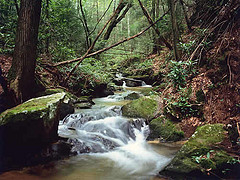
The uses and values of water in Pennsylvania are changing because of Marcellus Shale gas development.
UNIVERSITY PARK, Pa. — A Web-based seminar sponsored by Penn State Extension will examine municipalities’ roles related to water use and protection in the face of burgeoning Marcellus Shale gas development in Pennsylvania.
The 75-minute webinar will begin at 1 p.m. on March 15. Presenters are Charles Abdalla, professor of agricultural and environmental economics in Penn State’s College of Agricultural Sciences, and Peter Wulfhorst, extension educator based in Pike County, who specializes in economic and community development.
The uses and values of water are changing in Pennsylvania as a result of the rapid development of the Marcellus Shale gas industry, according to Abdalla. These changes are affecting municipal governments’ roles and activities and local outcomes and impacts.
“For example, there has been a significant increase in the demand for water needed in the hydraulic fracturing of shale gas wells,” he said. “Public water suppliers, including municipally owned systems, are meeting this demand and at the same time generating sizable revenues through water sales.
“Also, some municipalities have generated new revenues by leasing their mineral rights to watershed lands that supply water to their reservoirs and customers.”
Abdalla noted that the webinar will address three topics: water sales, leasing of municipally owned watershed lands and municipalities’ potential role in regulating land use to protect water.
“My webinar presentation will provide an overview of what we know — and don’t know — about these municipal activities, and existing and potential future issues.”
Wulfhorst will discuss the environmental safeguards that may be available under Pennsylvania law to help municipalities protect water.
“Specifically, I will cover the notification changes for both host municipality and adjacent municipality and landowners, and the requirement of a water-management plan not to adversely affect the quantity and quality of water resources,” he said.
“Also, I will review the increase in well-location restrictions for existing buildings, water wells, wetlands, public water supplies and streams, and I will discuss rules under which gas operators will be presumed to be responsible for water-supply pollution.”
The webinar is part of a monthly series of online workshops that provide education about the opportunities and challenges related to the state’s Marcellus Shale gas boom. Information about how to register for the session is available on the webinar page of Penn State Extension’s natural-gas website at http://extension.psu.edu/naturalgas/webinars.
Previous webinars, publications and information also are available on the Penn State Extension natural-gas website (http://extension.psu.edu/naturalgas), covering topics such as Marcellus gas development’s impact on transportation systems; seismic testing; air pollution from gas development; the gas boom’s effect on landfills; Marcellus gas water use and quality; zoning; gas-leasing considerations for landowners; implications for local communities; gas pipelines and right-of-way issues; legal issues surrounding gas development; and the impact of Marcellus gas development on forestland.
For more information, contact John Turack, extension educator based in Westmoreland County, at (724) 837-1402 or by email at jdt15@psu.edu.
Webinar to examine Marcellus development impacts on transportation
live.psu.edu/story/57591#nw69
Friday, February 3, 2012
UNIVERSITY PARK, Pa. — A Web-based seminar sponsored by Penn State Extension will

Thousands of trips made by water trucks, seismic trucks, drilling rigs and construction equipment to and from the Marcellus fields are having a serious impact on transportation patterns and road maintenance.
examine how Marcellus shale natural-gas development in Pennsylvania is affecting transportation patterns in the state.
The 75-minute webinar will begin at 1 p.m. on Feb. 16. Presenters include Scott Christy, deputy secretary for highway administration with PennDOT, and Mark Murawski, Lycoming County planning and community development director and longtime transportation planner.
Christy will discuss the statewide ramifications of the Marcellus play on commonwealth roads and highways. Thousands of trips made by water trucks, seismic trucks, drilling rigs and construction equipment to and from the Marcellus fields are having a serious impact on transportation patterns and road maintenance.
Murawski will provide information regarding transportation effects on the locally owned road and bridge system in Lycoming County. He also will highlight the changes to commercial and general aviation service at the Williamsport Regional Airport and to rail freight service that have resulted from Marcellus Shale gas-exploration activity.
“In addition, I want to inform webinar participants on a major initiative to develop a regional compressed-natural-gas fueling facility in the Williamsport area that will benefit River Valley Transit operations,” Murawski said. “It will spur other vehicle-fleet conversions from diesel to natural-gas fuels to fully utilize this local energy resource beneath our feet.”
The webinar is part of a monthly series of online workshops that provide education about the opportunities and challenges related to the state’s Marcellus Shale gas boom. Information about how to register for the session is available on the webinar page of Penn State Extension’s natural-gas website at http://extension.psu.edu/naturalgas/webinars.
The next webinar in the series, at 1 p.m. on March 15, will focus on municipalities’ roles related to water use and protection.
Previous webinars, publications and information also are available on the Penn State Extension natural-gas website (http://extension.psu.edu/naturalgas), covering topics such as seismic testing, air pollution from gas development; the gas boom’s effect on landfills; water use and quality; zoning; gas-leasing considerations for landowners; implications for local communities; gas pipelines and right-of-way issues; legal issues surrounding gas development; and the impact of Marcellus gas development on forestland.
For more information, contact John Turack, extension educator based in Westmoreland County, at 724-837-1402 or by email at jdt15@psu.edu.
Jan. 19 webinar to look at seismic testing with Marcellus gas play
live.psu.edu/story/57147#nw69
Thursday, January 12, 2012
UNIVERSITY PARK, Pa. — A Web-based seminar sponsored by Penn State Extension will examine seismic testing associated with Marcellus gas development in Pennsylvania.
Titled “Seismic Testing: What’s It All About?”, the 75-minute webinar will begin at 1 p.m. on Jan. 19. Presenters will be Kenneth Hall, of Kenneth Hall Consulting Services of Snow Shoe, Pa., and Dennis Langlois, of Houston, Appalachian region sales and marketing manager for CGG Veritas.
Hall is a retired financial adviser who has been involved in natural-gas leasing and investment for more than 15 years. He manages more than 30,000 acres of gas rights in northern Centre County and has negotiated gas leases on more than 40,000 acres.
Langlois has been in the seismic business for 32 years, the past 24 years with CGG Veritas Land Surveys. He started working on field crews in an entry-level position and worked his way up to his current job.
During the Jan. 19 webinar, Hall will discuss the potential problems that may be encountered with seismic testing and conditions property owners should require prior to approving the testing.
“Attaching conditions to the approval will minimize any potential conflicts,” he said, noting that he has been assisting property owners and mineral owners with their conflicts for many years.
“I have seen seismic testing from all sides: surface owners who do not own their mineral rights, leaseholders, gas companies and seismic companies. My experience with the potential conflicts of each party gives me unique insight into seismic-testing issues.”
Langlois will offer a slide presentation, giving a brief summary of events that take place in acquiring a 3-D seismic survey, from the initial contact with the landowners until his company has acquired the data and left the area.
“The slide presentation will show maps with surface abstracts and the recording grid needed to image the subsurface,” he said. “There also will be pictures showing the different operations and the equipment that will be used to acquire this data.”
Langlois hopes webinar participants will ask questions about the process because he is hoping to dispel misconceptions and clarify misinformation about seismic-testing operations.
The webinar is part of a monthly series of online workshops addressing opportunities and challenges related to the state’s Marcellus Shale gas boom. Information about how to register for the session is available on the webinar page of Penn State Extension’s natural-gas website.
< http://extension.psu.edu/naturalgas/webinars >
Future webinars will focus on transportation patterns and impacts from Marcellus development, and municipalities’ roles related to water use and protection.
Previous webinars, publications and information also are available on the Penn State Extension natural-gas website, < http://extension.psu.edu/naturalgas > covering topics such as air pollution from gas development; the gas boom’s effect on landfills; water use and quality; zoning; gas-leasing considerations for landowners; implications for local communities; gas pipelines and right-of-way issues; legal issues surrounding gas development; and the impact of Marcellus gas development on forestland.
For more information, contact John Turack, extension educator based in Westmoreland County, at 724-837-1402 or by email at jdt15@psu.edu.
Penn State Extension – Natural Gas
Natural Gas < http://extension.psu.edu/naturalgas >
Marcellus shale has the potential to affect many parts of Pennsylvania. Since 2001, we have been actively helping citizens, landowners, businesses, local governments, and others understand the opportunities and challenges arising from Marcellus shale. Let us help you, too.
Webinars < http://extension.psu.edu/naturalgas/webinars/ >
This series includes the upcoming webinar schedule, and the recorded webinars and related materials.

